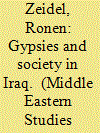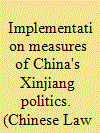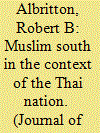| Srl | Item |
| 1 |
ID:
128211


|
|
|
|
|
| Publication |
2014.
|
| Summary/Abstract |
This article focuses on a Gypsy group that lives in Iraq, away from the main concentrations in Europe. Although Gypsies apparently arrived in Mesopotamia around the tenth century, long before many Arab tribes and despite their cultural assimilation into the local culture, Gypsies were not assimilated into the local society, partly because the local society rejected them and partly because they did not want to assimilate. The difference in the attitude of the local society to the Gypsies lies in their perceived 'impurity' and their occupation, dancing and music, in which Gypsy women are employed. Iraqi Gypsies had long suffered from social as well as governmental discrimination: Iraqi citizenship was given to them only in 1979. Unexpectedly, it was the Iraqi dictatorship of Saddam Hussein which improved their status considerably, yet, at the same time, made them dependent on the regime. Consequently, after the fall of the Ba`th regime, Gypsies now face a bleak future. The article gives a concise historical presentation of Gypsy life in twentieth century Iraq and takes a closer look at literary views of the Gypsies, reflecting the limits of liberal attitudes toward them.
|
|
|
|
|
|
|
|
|
|
|
|
|
|
|
|
| 2 |
ID:
129268


|
|
|
|
|
| Publication |
2012.
|
| Summary/Abstract |
This issue is a collection of twelve documents on the policies in Xinjiang. These policies can be grouped into four categories: economic inducements, ideological indoctrination, cultural assimilation, and social control. Economic inducements are provided on the assumption that economic growth will benefit the ethnic minorities. Satisfied materially, their tendency to resist is weakened. Ideological indoctrination has the power to cultivate political identification with the regime of China through an official narrative of historical view and the contribution of the regime to the economic and social development of Xinjiang. Cultural assimilation is to integrate Uighurs culturally with the Han-dominated Chinese culture through education. Social control is to establish a coercive system for preventing subversion and punishing the secessionists in order to weaken the will to resist.
|
|
|
|
|
|
|
|
|
|
|
|
|
|
|
|
| 3 |
ID:
094421


|
|
|
|
|
| Publication |
2010.
|
| Summary/Abstract |
The years since 2004 have been marked by a level of insurgency in the southern region of Thailand unknown for decades. An accurate perspective on this conflict requires a deeper understanding of differences between the Buddhist and Muslim Thais of the region than has been evident in public and academic discourse. This study utilizes data from a survey taken in 2006, of attitudes and political orientations across all regions of Thailand, including an independent sample of the southern region. The data indicate that southerners are different from the rest of Thailand, whether Buddhist or Muslim; that Malay-speaking Muslims are different from other Muslims; and that sympathy for the insurgency lies not in religion, but in defending practices associated with loyalty to specific forms of Malay culture that characterize the region.
|
|
|
|
|
|
|
|
|
|
|
|
|
|
|
|
| 4 |
ID:
129455


|
|
|
|
|
| Publication |
2014.
|
| Summary/Abstract |
There has been a long-entrenched view that China's Qing Dynasty was a 'Manchu Dynasty', which imposed alien conquest on China's majority of the ethnic Han. Such a view has made the Manchus allegedly responsible for all the social evils from the 1840 Opium War onwards on the one hand and all the 'anti-Manchu' sentimentalities and movements, such as the Taipings and Republicans, automatically legitimate and revolutionary on the other. This article challenges this stereotype and argues with historical evidence that the 'Manchu rule' was a myth. Social conflicts in late Qing were mainly between the Han Chinese themselves. It is time to end the 'Manchu rule' as an easy pretext to conceal the true social issues and problems in the nineteenth- and twentieth-century China.
|
|
|
|
|
|
|
|
|
|
|
|
|
|
|
|